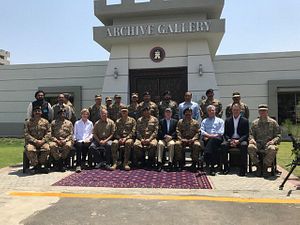A five-member delegation of the United States Senate recently visited Pakistan. The delegation, headed by Senator John McCain, chairman of the Senate Committee on Armed Services, also visited the country’s tribal areas and acknowledged Pakistan’s counterterrorism efforts.
While visiting the Federally Administrated Tribal Areas (FATA), McCain in a statement said that Pakistan and United States’ “relationship is more important perhaps than ever before.” McCain also noted that “We will not have peace in the region without Pakistan.”
The U.S. Senate delegation’s visit to Pakistan and appreciation of the country’s counterterrorism efforts marks a break with the Trump administration’s anticipated tough approach toward Islamabad. President Donald Trump a few weeks ago put Pakistan on notice with warnings that Islamabad had to act against all militant groups if the country wishes to keep Washington’s friendly nod.
McCain’s visit to Pakistan came at a time when the relationship between the two countries has hit its lowest point in a few years, reflecting the confusion and bewilderment of policymakers in Washington when it comes to formulating a workable strategy toward Islamabad.
There are two major camps in the United States as far as Washington’s outlook toward Pakistan is concerned. Trump’s policy of getting tough with Pakistan reflects the approach of the group that believes that tough actions are necessary to change the country’s views on regional security. The other group, however, believes that while Pakistan needs to and can do more to confront militant groups, the country is bound by some constraints that are not altogether devoid of legitimacy and should be taken into account before formulating a “get tough” policy toward Islamabad.
The recent delegation that visited Pakistan belongs to the group that reflects Islamabad’s limited support base in Washington. In a way, the statements given by the visiting delegation in favor of Pakistan’s counterterrorism efforts were meant to address Trump’s South Asia team. The message that the delegation attempted to send was clear: Pakistan’s virtual isolation is neither in U.S. interests nor does it support the country’s efforts to restore peace in Afghanistan.
Moreover, recent statements paying heed to Pakistan’s view and narrative on security also underline Washington’s deep dilemma of relying on Pakistan when it comes to sorting out the security and political mess in Afghanistan. A number of scholars have recently suggested that getting tough with Pakistan is the only way forward, for all other options of soft diplomacy have been tried and tested unsuccessfully. However, what these suggestions mostly fail to discuss is Washington’s failure to develop Afghanistan’s domestic institutional infrastructure to the point where it can deliver effectively in a number of political, economic, and security areas.
If Pakistan has not cooperated as Washington may have desired, it doesn’t mean that the country is responsible for all the security and political disorder in Afghanistan. Afghanistan remains bitterly divided politically and different ethnic factions and warlords continue to operate away from the state’s jurisdiction. Even after more than one decade of training and financial support, the country’s security infrastructure remains dysfunctional and inept, constantly failing to confront militant challenges on its own. In this context, blaming Pakistan for all of what is wrong in Afghanistan is not the foundation of a good policy. In fact, the right policy should include a review of the Afghan leadership’s commitment and ability to put the country’s domestic institutional base in order, which is essential in confronting a range of challenges that the country faces.
Arguably, Washington has already had a tough approach toward Pakistan, with a majority of the country’s financial assistance coming to Islamabad with conditions. It’s unclear whether putting more pressure on Pakistan can bring about any change in the country’s policy, for this approach has failed in the past. However, what is clear is that any further chokes on Pakistan will surely push Islamabad out from Washington’s sphere of influence.
The ideal approach, therefore, should be continued U.S. engagement with Pakistan while adopting a tougher approach with Afghanistan. It’s undeniable that unless Afghanistan is prepared to push back against challenges on its own, none of the existing regional frameworks can become successful. Kabul cannot continue to find scapegoats in Pakistan for its own failures to confront domestic militant challenges, largely due to the lack of political unity and an ineffective counterterrorism policy.
In this regard, perhaps the most effective policy might be to engage Islamabad diplomatically to deliver on Afghanistan rather than threatening the country with sanctions and tough checks, which is unlikely to bring about any substantial change. For instance, one of the key takeaways of the recent U.S. senatorial visit was that both Pakistan and Afghanistan have agreed to carry out joint counterterrorism operations, which will be monitored by the United States. Moving forward with an approach that promotes joint cooperation can be far more effective than isolating one country or the other.
The United States is fighting an open-ended war in Afghanistan and the isolation of one country or the other will not bring out effective change.































